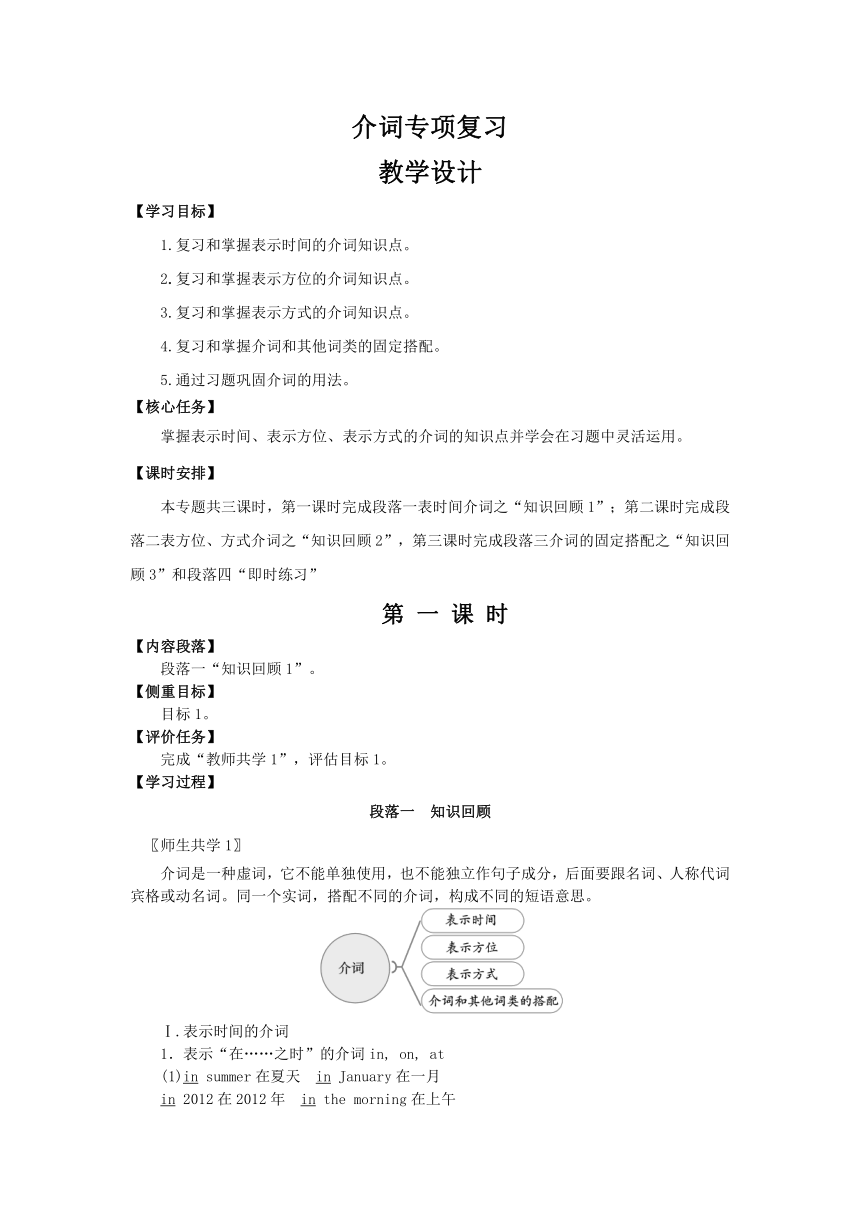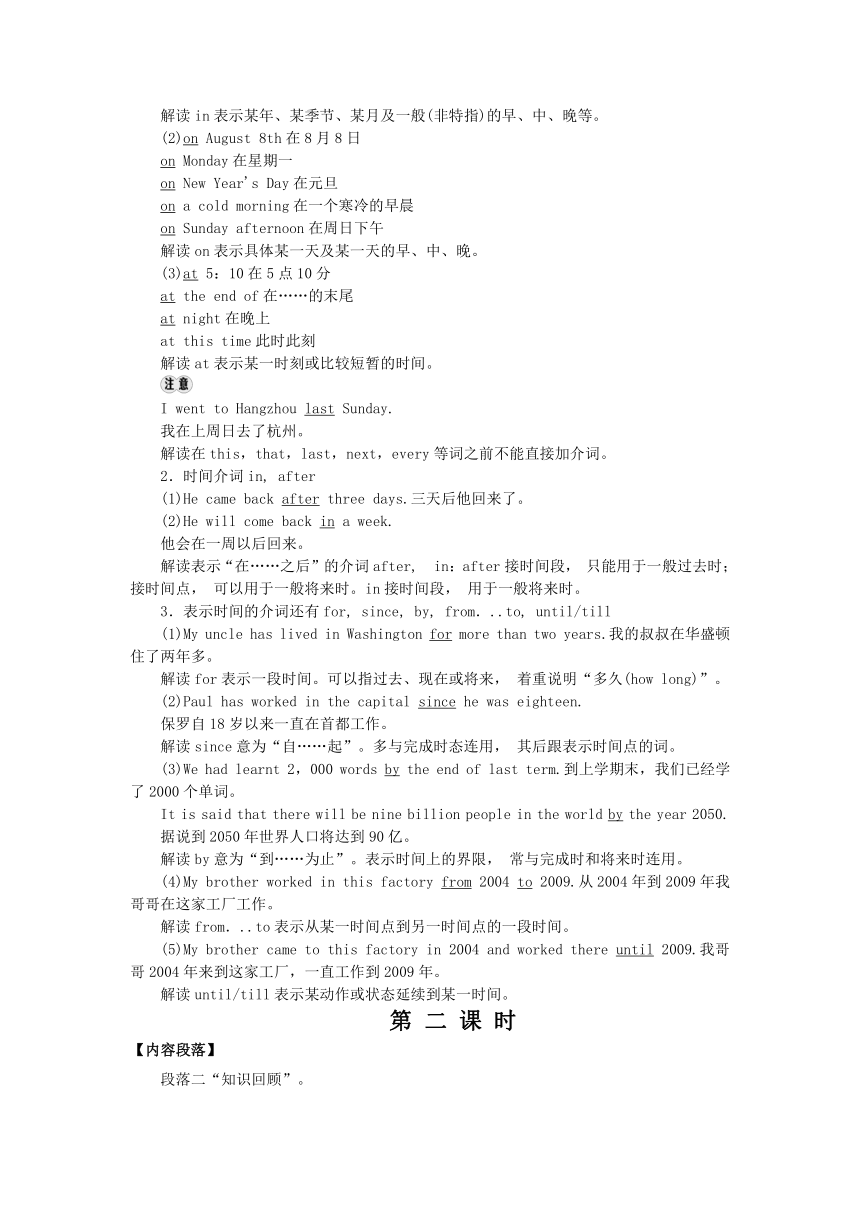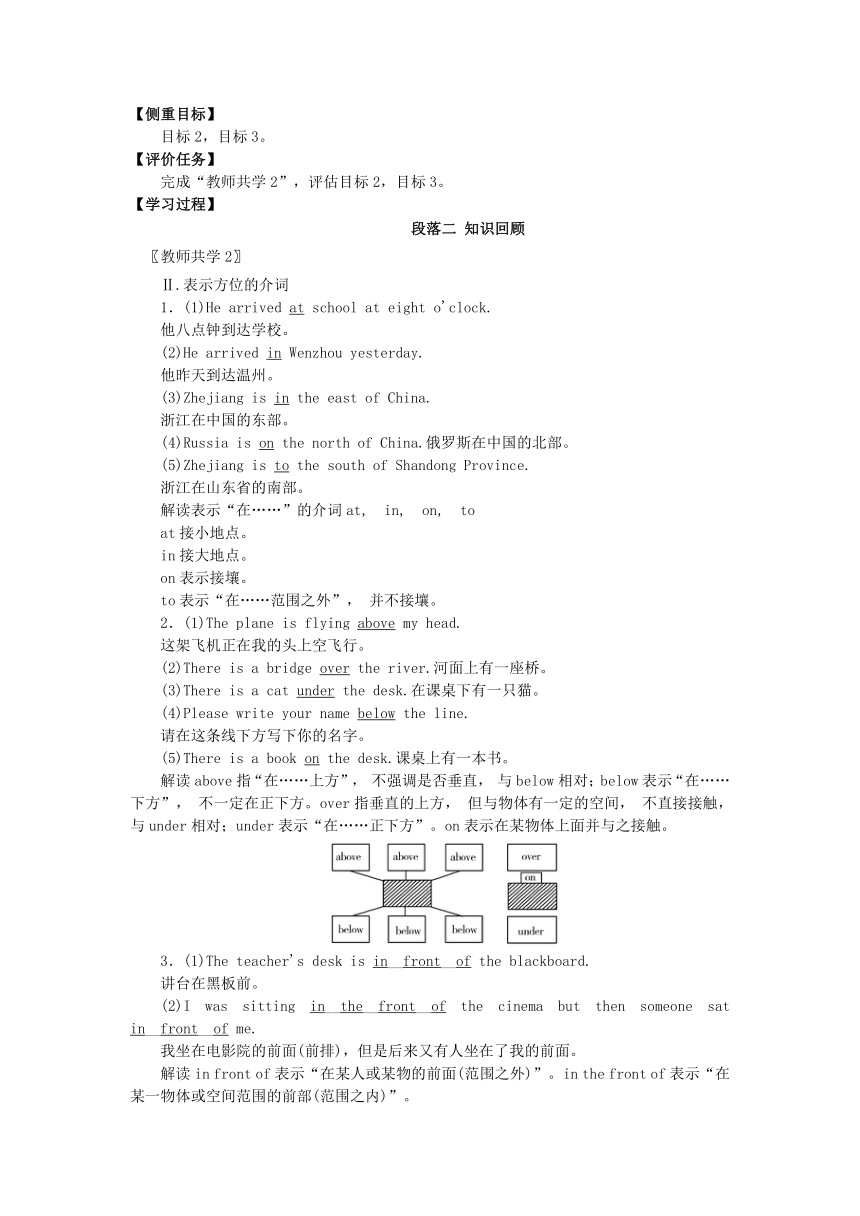2024年人教版中考英语复习介词专项教案
文档属性
| 名称 | 2024年人教版中考英语复习介词专项教案 |

|
|
| 格式 | docx | ||
| 文件大小 | 568.9KB | ||
| 资源类型 | 教案 | ||
| 版本资源 | 人教新目标(Go for it)版 | ||
| 科目 | 英语 | ||
| 更新时间 | 2024-02-23 13:06:30 | ||
图片预览



文档简介
介词专项复习
教学设计
【学习目标】
1.复习和掌握表示时间的介词知识点。
2.复习和掌握表示方位的介词知识点。
3.复习和掌握表示方式的介词知识点。
4.复习和掌握介词和其他词类的固定搭配。
5.通过习题巩固介词的用法。
【核心任务】
掌握表示时间、表示方位、表示方式的介词的知识点并学会在习题中灵活运用。
【课时安排】
本专题共三课时,第一课时完成段落一表时间介词之“知识回顾1”;第二课时完成段落二表方位、方式介词之“知识回顾2”,第三课时完成段落三介词的固定搭配之“知识回顾3”和段落四“即时练习”
第 一 课 时
【内容段落】
段落一“知识回顾1”。
【侧重目标】
目标1。
【评价任务】
完成“教师共学1”,评估目标1。
【学习过程】
段落一 知识回顾
〖师生共学1〗
介词是一种虚词,它不能单独使用,也不能独立作句子成分,后面要跟名词、人称代词宾格或动名词。同一个实词,搭配不同的介词,构成不同的短语意思。
Ⅰ.表示时间的介词
1.表示“在……之时”的介词in, on, at
(1)in summer在夏天 in January在一月
in 2012在2012年 in the morning在上午
解读in表示某年、某季节、某月及一般(非特指)的早、中、晚等。
(2)on August 8th在8月8日
on Monday在星期一
on New Year's Day在元旦
on a cold morning在一个寒冷的早晨
on Sunday afternoon在周日下午
解读on表示具体某一天及某一天的早、中、晚。
(3)at 5:10在5点10分
at the end of在……的末尾
at night在晚上
at this time此时此刻
解读at表示某一时刻或比较短暂的时间。
I went to Hangzhou last Sunday.
我在上周日去了杭州。
解读在this,that,last,next,every等词之前不能直接加介词。
2.时间介词in, after
(1)He came back after three days.三天后他回来了。
(2)He will come back in a week.
他会在一周以后回来。
解读表示“在……之后”的介词after, in:after接时间段, 只能用于一般过去时;接时间点, 可以用于一般将来时。in接时间段, 用于一般将来时。
3.表示时间的介词还有for, since, by, from...to, until/till
(1)My uncle has lived in Washington for more than two years.我的叔叔在华盛顿住了两年多。
解读for表示一段时间。可以指过去、现在或将来, 着重说明“多久(how long)”。
(2)Paul has worked in the capital since he was eighteen.
保罗自18岁以来一直在首都工作。
解读since意为“自……起”。多与完成时态连用, 其后跟表示时间点的词。
(3)We had learnt 2,000 words by the end of last term.到上学期末,我们已经学了2000个单词。
It is said that there will be nine billion people in the world by the year 2050.
据说到2050年世界人口将达到90亿。
解读by意为“到……为止”。表示时间上的界限, 常与完成时和将来时连用。
(4)My brother worked in this factory from 2004 to 2009.从2004年到2009年我哥哥在这家工厂工作。
解读from...to表示从某一时间点到另一时间点的一段时间。
(5)My brother came to this factory in 2004 and worked there until 2009.我哥哥2004年来到这家工厂,一直工作到2009年。
解读until/till表示某动作或状态延续到某一时间。
第 二 课 时
【内容段落】
段落二“知识回顾”。
【侧重目标】
目标2,目标3。
【评价任务】
完成“教师共学2”,评估目标2,目标3。
【学习过程】
段落二 知识回顾
〖教师共学2〗
Ⅱ.表示方位的介词
1.(1)He arrived at school at eight o'clock.
他八点钟到达学校。
(2)He arrived in Wenzhou yesterday.
他昨天到达温州。
(3)Zhejiang is in the east of China.
浙江在中国的东部。
(4)Russia is on the north of China.俄罗斯在中国的北部。
(5)Zhejiang is to the south of Shandong Province.
浙江在山东省的南部。
解读表示“在……”的介词at, in, on, to
at接小地点。
in接大地点。
on表示接壤。
to表示“在……范围之外”, 并不接壤。
2.(1)The plane is flying above my head.
这架飞机正在我的头上空飞行。
(2)There is a bridge over the river.河面上有一座桥。
(3)There is a cat under the desk.在课桌下有一只猫。
(4)Please write your name below the line.
请在这条线下方写下你的名字。
(5)There is a book on the desk.课桌上有一本书。
解读above指“在……上方”, 不强调是否垂直, 与below相对;below表示“在……下方”, 不一定在正下方。over指垂直的上方, 但与物体有一定的空间, 不直接接触, 与under相对;under表示“在……正下方”。on表示在某物体上面并与之接触。
3.(1)The teacher's desk is in__front__of the blackboard.
讲台在黑板前。
(2)I was sitting in__the__front__of the cinema but then someone sat in__front__of me.
我坐在电影院的前面(前排),但是后来又有人坐在了我的前面。
解读in front of表示“在某人或某物的前面(范围之外)”。in the front of表示“在某一物体或空间范围的前部(范围之内)”。
4.(1)He swam across the river.他游过了河。
(2)The Great Wall runs over many mountains.
长城穿过崇山峻岭。
(3)I like exciting trips.I'd love to travel through the jungle next summer, because it's a good place to explore.我喜欢令人兴奋的旅行。我想明年夏天去穿越丛林,因为那是个探险的好去处。
(4)We walked past the hospital.我们从医院旁边走过。
解读across表示“横穿”, 表示从一边到另一边, 与on有关。over表示“越过”, 表示跨过一段距离。past表示从某物旁边经过。through表示“穿过”, 表示通过一个空间, 与in有关。
5.(1)Our school is between the hospital and the bookstore.我们学校在医院和书店之间。
(2)Mike is sitting among the students, so it's not easy to find him.
迈克坐在同学们中间,所以要找到他真是不容易。
解读between指在两个人或两个事物之间;among指在三个或三个以上的人或事物之间。
6.(1)Her mother works in the cinema.
她的妈妈在电影院工作。
(2)The child ran into his mother's arms.
这个孩子跑进他妈妈的怀抱。
(3)All the children rushed out__of the classroom when the bell rang.当铃声响起,所有的孩子都冲出了教室。
解读in表示“在……里面”, 用于表示静止的位置。into表示“进入……里面”, 用于表示有特定终点的运动方向, 经常与表示动作的动词连用, 如come, go, run, rush等。与into相对的介词短语有out of(从……里出来), 也表示有一定的运动方向。
Ⅲ.表示方式的介词
1.(1)Why don't we go there by bus
我们为什么不坐公交车去那里呢?
(2)He makes a living by selling newspapers.
他以卖报为生。
(3)We had to do all the work by hand.
所有的活儿我们都必须手工完成。
解读by表示“以……方法、手段或泛指用某种交通工具”。
2.(1)He wrote the letter with a pen.他用钢笔写那封信。
(2)How amazing! The boy can write with his two hands at the same time.
多令人惊讶啊!这个男孩能同时用两只手写字。
解读with表示“用……工具”。
3.(1)Say it in English.用英语说。
(2)He told me the news in a low voice.
他低声告诉我那个消息。
解读in表示“以……方式;用……语言(语调、笔墨、颜色)”。
第 三 课 时
【内容段落】
段落三“知识回顾”。
段落四“即时练习”
【侧重目标】
目标4,目标5。
【评价任务】
完成“教师共学3”,评估目标4。
完成“小组合学”,评估目标5。
【学习过程】
段落三 知识回顾
〖教师共学3〗
Ⅳ.介词和其他词类的搭配
介词和动词、形容词、名词等常常构成固定搭配,也就是说,在这些词的后面,常常要求用固定的介词。
1.形容词与介词的固定搭配
(1)形容词+about
be careful about小心 be worried about担心 be careless of 不在意
(2)形容词+at
be good at擅长 be mad at对……发怒/恼火 be surprised at对……感到惊奇
(3)形容词+for
be famous for因……出名 get/be ready for为……准备好
be sorry for后悔 be late for迟到;没赶上
(4)形容词+from
be different from与……不同 be absent from缺席
(5)形容词+in
be interested in对……感兴趣
(6)形容词+of
be tired of厌倦 be afraid of害怕
(7)形容词+with
be busy with忙于
2.名词与介词的固定搭配
有的名词后面要求跟固定的介词,常见的有:
(1)名词+in
have difficulty in...在……有困难
(2)名词+to
the answer to...……的答案/回答 the key to...……的答案/钥匙/关键
(3)名词+with
have a talk with与……谈话 have a word with与……说话
3.副词与介词的搭配
instead of代替 away from离开 next to紧挨着 far from远离
4.动词和介词的搭配
laugh at嘲笑 take part in参加 leave for离开;前往 catch up with赶上
hear from收到……的来信 pay for支付;付钱
stop (sb.) from doing (sth.)阻止(某人)做(某事) get up起床 help with在……方面帮忙
Ⅴ.其他介词
1.except
Everyone is very excited except him.除了他,每个人都很激动。
解读不包括后面所提到的人或物在内的“除去”, 作“只有……除外”讲。
2.besides
Besides reading, I also like watching movies.除了读书,我也喜欢看电影。
解读表示“包括”, 作“除了……外还有……”讲。
3.including
Thirty people were killed in the traffic accident, including a baby.在这次交通事故中有三十个人丧生,其中包括一个婴儿。
解读表示“包括,包含”。
4.as
Let me speak to you as a mother.作为一位妈妈让我跟你谈谈。
5.like
Let me speak to you like a mother.让我像一位妈妈一样和你说话。
解读like“像……一样”, 不是事实。
6.beyond
The worker's deed was beyond his duty.这个工人的行为超出了职责。
7.through
He won what he wanted through hard work.他通过努力工作获得了他想要的东西。
8.without
He can't achieve his dream without his teachers' help.没有他的老师们的帮助,他不可能实现梦想。
9.during
During the meal we talked about the activity we did.在吃饭时我们讨论了我们做过的活动。
解读during“在……期间”, 后接时间段。
段落四 即时练习
〖小组合学〗
一、根据句意及首字母填写合适的单词。
1.To my pleasure, my family is always behind__ me whatever I decide to do.
2.My sister usually goes to school by bike except__ on rainy days.
3.—Oliver, can you tell us the differences among__ the four words
—Sorry, I don't know.
4.—Jack, dinner is ready.Wash hands before__ dinner.
—OK.I'll do it.
5.The temperature remained below__ zero.It was so cold that my family didn't want to go outside.
6.Jim sat opposite__ Larry and they had lunch face to face.
7.A big bird is flying over__ the bridge.
8.Just now I saw several boys running across__ the street. They are opposite the school now.
9.Ben was helping his mother when the rain began to beat heavily against__ the windows.
10.They usually go shopping during__ their lunch break.
二、根据句意用合适的介词填空。
1.Mr.Smith is going to the airport __by__ taxi.
2.We all went to Jane's birthday party __except__ Tom. He had to look after his younger brother at home.
3.—Which is your new English teacher
—The young lady__in__ red over there.
4.—Junior high school days will be over__in__ a week.How are you feeling
—I'm trying to keep my cool because we've been together__for__ three years.
5.Don't stay inside__on__ such a sunny morning.Let's go out to enjoy the gentle wind and the sweet flowers.
6.A woman stood__by__ the window, watching the children playing games in the garden.
7.__In__ my opinion, there must be life on other planets though none has been discovered.
8.—I'm thirsty.I'd like a glass of orange juice.What about you, Dad
—I prefer a cup of coffee__with__ nothing in it.
9.We won! The honor belongs __to__ all the members of our team.
10.—Who is better __at__ playing basketball, you or your brother
—My brother.He does better __in__ playing basketball.
【教学反思】
教学设计
【学习目标】
1.复习和掌握表示时间的介词知识点。
2.复习和掌握表示方位的介词知识点。
3.复习和掌握表示方式的介词知识点。
4.复习和掌握介词和其他词类的固定搭配。
5.通过习题巩固介词的用法。
【核心任务】
掌握表示时间、表示方位、表示方式的介词的知识点并学会在习题中灵活运用。
【课时安排】
本专题共三课时,第一课时完成段落一表时间介词之“知识回顾1”;第二课时完成段落二表方位、方式介词之“知识回顾2”,第三课时完成段落三介词的固定搭配之“知识回顾3”和段落四“即时练习”
第 一 课 时
【内容段落】
段落一“知识回顾1”。
【侧重目标】
目标1。
【评价任务】
完成“教师共学1”,评估目标1。
【学习过程】
段落一 知识回顾
〖师生共学1〗
介词是一种虚词,它不能单独使用,也不能独立作句子成分,后面要跟名词、人称代词宾格或动名词。同一个实词,搭配不同的介词,构成不同的短语意思。
Ⅰ.表示时间的介词
1.表示“在……之时”的介词in, on, at
(1)in summer在夏天 in January在一月
in 2012在2012年 in the morning在上午
解读in表示某年、某季节、某月及一般(非特指)的早、中、晚等。
(2)on August 8th在8月8日
on Monday在星期一
on New Year's Day在元旦
on a cold morning在一个寒冷的早晨
on Sunday afternoon在周日下午
解读on表示具体某一天及某一天的早、中、晚。
(3)at 5:10在5点10分
at the end of在……的末尾
at night在晚上
at this time此时此刻
解读at表示某一时刻或比较短暂的时间。
I went to Hangzhou last Sunday.
我在上周日去了杭州。
解读在this,that,last,next,every等词之前不能直接加介词。
2.时间介词in, after
(1)He came back after three days.三天后他回来了。
(2)He will come back in a week.
他会在一周以后回来。
解读表示“在……之后”的介词after, in:after接时间段, 只能用于一般过去时;接时间点, 可以用于一般将来时。in接时间段, 用于一般将来时。
3.表示时间的介词还有for, since, by, from...to, until/till
(1)My uncle has lived in Washington for more than two years.我的叔叔在华盛顿住了两年多。
解读for表示一段时间。可以指过去、现在或将来, 着重说明“多久(how long)”。
(2)Paul has worked in the capital since he was eighteen.
保罗自18岁以来一直在首都工作。
解读since意为“自……起”。多与完成时态连用, 其后跟表示时间点的词。
(3)We had learnt 2,000 words by the end of last term.到上学期末,我们已经学了2000个单词。
It is said that there will be nine billion people in the world by the year 2050.
据说到2050年世界人口将达到90亿。
解读by意为“到……为止”。表示时间上的界限, 常与完成时和将来时连用。
(4)My brother worked in this factory from 2004 to 2009.从2004年到2009年我哥哥在这家工厂工作。
解读from...to表示从某一时间点到另一时间点的一段时间。
(5)My brother came to this factory in 2004 and worked there until 2009.我哥哥2004年来到这家工厂,一直工作到2009年。
解读until/till表示某动作或状态延续到某一时间。
第 二 课 时
【内容段落】
段落二“知识回顾”。
【侧重目标】
目标2,目标3。
【评价任务】
完成“教师共学2”,评估目标2,目标3。
【学习过程】
段落二 知识回顾
〖教师共学2〗
Ⅱ.表示方位的介词
1.(1)He arrived at school at eight o'clock.
他八点钟到达学校。
(2)He arrived in Wenzhou yesterday.
他昨天到达温州。
(3)Zhejiang is in the east of China.
浙江在中国的东部。
(4)Russia is on the north of China.俄罗斯在中国的北部。
(5)Zhejiang is to the south of Shandong Province.
浙江在山东省的南部。
解读表示“在……”的介词at, in, on, to
at接小地点。
in接大地点。
on表示接壤。
to表示“在……范围之外”, 并不接壤。
2.(1)The plane is flying above my head.
这架飞机正在我的头上空飞行。
(2)There is a bridge over the river.河面上有一座桥。
(3)There is a cat under the desk.在课桌下有一只猫。
(4)Please write your name below the line.
请在这条线下方写下你的名字。
(5)There is a book on the desk.课桌上有一本书。
解读above指“在……上方”, 不强调是否垂直, 与below相对;below表示“在……下方”, 不一定在正下方。over指垂直的上方, 但与物体有一定的空间, 不直接接触, 与under相对;under表示“在……正下方”。on表示在某物体上面并与之接触。
3.(1)The teacher's desk is in__front__of the blackboard.
讲台在黑板前。
(2)I was sitting in__the__front__of the cinema but then someone sat in__front__of me.
我坐在电影院的前面(前排),但是后来又有人坐在了我的前面。
解读in front of表示“在某人或某物的前面(范围之外)”。in the front of表示“在某一物体或空间范围的前部(范围之内)”。
4.(1)He swam across the river.他游过了河。
(2)The Great Wall runs over many mountains.
长城穿过崇山峻岭。
(3)I like exciting trips.I'd love to travel through the jungle next summer, because it's a good place to explore.我喜欢令人兴奋的旅行。我想明年夏天去穿越丛林,因为那是个探险的好去处。
(4)We walked past the hospital.我们从医院旁边走过。
解读across表示“横穿”, 表示从一边到另一边, 与on有关。over表示“越过”, 表示跨过一段距离。past表示从某物旁边经过。through表示“穿过”, 表示通过一个空间, 与in有关。
5.(1)Our school is between the hospital and the bookstore.我们学校在医院和书店之间。
(2)Mike is sitting among the students, so it's not easy to find him.
迈克坐在同学们中间,所以要找到他真是不容易。
解读between指在两个人或两个事物之间;among指在三个或三个以上的人或事物之间。
6.(1)Her mother works in the cinema.
她的妈妈在电影院工作。
(2)The child ran into his mother's arms.
这个孩子跑进他妈妈的怀抱。
(3)All the children rushed out__of the classroom when the bell rang.当铃声响起,所有的孩子都冲出了教室。
解读in表示“在……里面”, 用于表示静止的位置。into表示“进入……里面”, 用于表示有特定终点的运动方向, 经常与表示动作的动词连用, 如come, go, run, rush等。与into相对的介词短语有out of(从……里出来), 也表示有一定的运动方向。
Ⅲ.表示方式的介词
1.(1)Why don't we go there by bus
我们为什么不坐公交车去那里呢?
(2)He makes a living by selling newspapers.
他以卖报为生。
(3)We had to do all the work by hand.
所有的活儿我们都必须手工完成。
解读by表示“以……方法、手段或泛指用某种交通工具”。
2.(1)He wrote the letter with a pen.他用钢笔写那封信。
(2)How amazing! The boy can write with his two hands at the same time.
多令人惊讶啊!这个男孩能同时用两只手写字。
解读with表示“用……工具”。
3.(1)Say it in English.用英语说。
(2)He told me the news in a low voice.
他低声告诉我那个消息。
解读in表示“以……方式;用……语言(语调、笔墨、颜色)”。
第 三 课 时
【内容段落】
段落三“知识回顾”。
段落四“即时练习”
【侧重目标】
目标4,目标5。
【评价任务】
完成“教师共学3”,评估目标4。
完成“小组合学”,评估目标5。
【学习过程】
段落三 知识回顾
〖教师共学3〗
Ⅳ.介词和其他词类的搭配
介词和动词、形容词、名词等常常构成固定搭配,也就是说,在这些词的后面,常常要求用固定的介词。
1.形容词与介词的固定搭配
(1)形容词+about
be careful about小心 be worried about担心 be careless of 不在意
(2)形容词+at
be good at擅长 be mad at对……发怒/恼火 be surprised at对……感到惊奇
(3)形容词+for
be famous for因……出名 get/be ready for为……准备好
be sorry for后悔 be late for迟到;没赶上
(4)形容词+from
be different from与……不同 be absent from缺席
(5)形容词+in
be interested in对……感兴趣
(6)形容词+of
be tired of厌倦 be afraid of害怕
(7)形容词+with
be busy with忙于
2.名词与介词的固定搭配
有的名词后面要求跟固定的介词,常见的有:
(1)名词+in
have difficulty in...在……有困难
(2)名词+to
the answer to...……的答案/回答 the key to...……的答案/钥匙/关键
(3)名词+with
have a talk with与……谈话 have a word with与……说话
3.副词与介词的搭配
instead of代替 away from离开 next to紧挨着 far from远离
4.动词和介词的搭配
laugh at嘲笑 take part in参加 leave for离开;前往 catch up with赶上
hear from收到……的来信 pay for支付;付钱
stop (sb.) from doing (sth.)阻止(某人)做(某事) get up起床 help with在……方面帮忙
Ⅴ.其他介词
1.except
Everyone is very excited except him.除了他,每个人都很激动。
解读不包括后面所提到的人或物在内的“除去”, 作“只有……除外”讲。
2.besides
Besides reading, I also like watching movies.除了读书,我也喜欢看电影。
解读表示“包括”, 作“除了……外还有……”讲。
3.including
Thirty people were killed in the traffic accident, including a baby.在这次交通事故中有三十个人丧生,其中包括一个婴儿。
解读表示“包括,包含”。
4.as
Let me speak to you as a mother.作为一位妈妈让我跟你谈谈。
5.like
Let me speak to you like a mother.让我像一位妈妈一样和你说话。
解读like“像……一样”, 不是事实。
6.beyond
The worker's deed was beyond his duty.这个工人的行为超出了职责。
7.through
He won what he wanted through hard work.他通过努力工作获得了他想要的东西。
8.without
He can't achieve his dream without his teachers' help.没有他的老师们的帮助,他不可能实现梦想。
9.during
During the meal we talked about the activity we did.在吃饭时我们讨论了我们做过的活动。
解读during“在……期间”, 后接时间段。
段落四 即时练习
〖小组合学〗
一、根据句意及首字母填写合适的单词。
1.To my pleasure, my family is always behind__ me whatever I decide to do.
2.My sister usually goes to school by bike except__ on rainy days.
3.—Oliver, can you tell us the differences among__ the four words
—Sorry, I don't know.
4.—Jack, dinner is ready.Wash hands before__ dinner.
—OK.I'll do it.
5.The temperature remained below__ zero.It was so cold that my family didn't want to go outside.
6.Jim sat opposite__ Larry and they had lunch face to face.
7.A big bird is flying over__ the bridge.
8.Just now I saw several boys running across__ the street. They are opposite the school now.
9.Ben was helping his mother when the rain began to beat heavily against__ the windows.
10.They usually go shopping during__ their lunch break.
二、根据句意用合适的介词填空。
1.Mr.Smith is going to the airport __by__ taxi.
2.We all went to Jane's birthday party __except__ Tom. He had to look after his younger brother at home.
3.—Which is your new English teacher
—The young lady__in__ red over there.
4.—Junior high school days will be over__in__ a week.How are you feeling
—I'm trying to keep my cool because we've been together__for__ three years.
5.Don't stay inside__on__ such a sunny morning.Let's go out to enjoy the gentle wind and the sweet flowers.
6.A woman stood__by__ the window, watching the children playing games in the garden.
7.__In__ my opinion, there must be life on other planets though none has been discovered.
8.—I'm thirsty.I'd like a glass of orange juice.What about you, Dad
—I prefer a cup of coffee__with__ nothing in it.
9.We won! The honor belongs __to__ all the members of our team.
10.—Who is better __at__ playing basketball, you or your brother
—My brother.He does better __in__ playing basketball.
【教学反思】
同课章节目录
- 词法
- 名词
- 动词和动词短语
- 动词语态
- 动词时态
- 助动词和情态动词
- 非谓语动词
- 冠词
- 代词
- 数词和量词
- 形容词副词及其比较等级
- 介词和介词短语
- 连词和感叹词
- 构词法
- 相似、相近词比较
- 句法
- 陈述句
- 一般疑问句和否定疑问句
- 特殊疑问句及选择疑问句
- 反意疑问句
- 存在句(There be句型)
- 宾语从句
- 定语从句
- 状语从句
- 主谓一致问题
- 简单句
- 并列句
- 复合句
- 主谓一致
- 主、表语从句
- 名词性从句
- 直接引语和间接引语
- 虚拟语气
- 感叹句
- 强调句
- 倒装句
- 祈使句
- 句子的成分
- 句子的分类
- 题型专区
- 单项选择部分
- 易错题
- 完形填空
- 阅读理解
- 词汇练习
- 听说训练
- 句型转换
- 补全对话
- 短文改错
- 翻译
- 书面表达
- 任务型阅读
- 语法填空
- 其他资料
